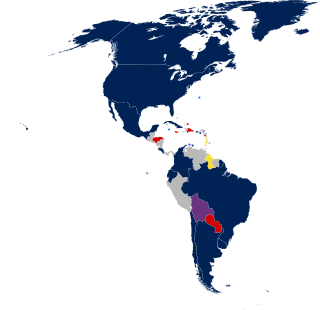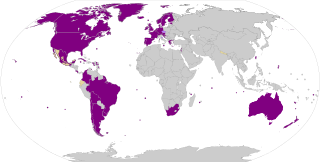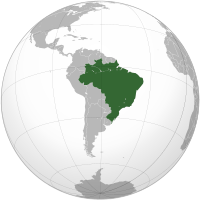
A civil union is a legally recognized arrangement similar to marriage, created primarily as a means to provide recognition in law for same-sex couples. Civil unions grant some or all of the rights of marriage.
Same-sex marriage has been legal in Brazil since 16 May 2013 in accordance with a decision from the National Justice Council, ordering notaries of every state to license and perform same-sex marriages. Brazil became the second country in South America to legalize same-sex marriage nationwide, after Argentina, and the twelfth worldwide to do so.

Lesbian, gay, bisexual, and transgender (LGBT) rights in Brazil rank among the highest in the world. Same-sex couples in Brazil have enjoyed the same rights guaranteed to heterosexual ones since 16 May 2013, including marriage and adoption. On June 13, 2019, the Brazilian Supreme Court ruled that discrimination on the basis of sexual orientation and gender identity is a crime akin to racism.

The legal status of same-sex marriage has changed in recent years in numerous jurisdictions around the world. The current trends and consensus of political authorities and religions throughout the world are summarized in this article.

The Brazilian Congressional Bill project No. 1151, authored by former congresswoman Marta Suplicy, from the Workers' Party of São Paulo, aims to change Brazilian federal law in order to establish same-sex civil unions. Specifically, it aims to amend Article 1723 of the Civil Code to define a civil union as between two unmarried individuals regardless of either partner's gender.

The rights of lesbian, gay, bisexual, and transgender (LGBT) people in Aruba, a constituent country of the Kingdom of the Netherlands, have evolved remarkably in the past decades. Both male and female same-sex sexual activity are legal in Aruba.

Laws governing lesbian, gay, bisexual, and transgender (LGBT) rights are complex and diverse in the Americas, and acceptance of LGBTQ persons varies widely.

Same-sex adoption in Brazil is legal according to the Superior Court of Justice of Brazil, as stated in a court decision on April 27, 2010. The change was a milestone in the country's LGBT history.

Anti-discrimination laws in Brazil are present in the Constitution of Brazil, in the labour law, in the child and adolescent law, in the ageing law, and in the penal code.

This article is intended to give an overview of the history of LGBT rights in Brazil.
Same-sex marriage in Alagoas has been legal since 7 December 2011. Alagoas was the first Brazilian state to legalize same-sex marriage. Civil unions have also been available since 2011.

ADPF 187, is a landmark Brazil Supreme Court case. The rapporteur Celso de Mello voted in favor of protests of decriminalization of drugs.

Lesbian, gay, bisexual, and transgender (LGBT) rights are liberal in Bahia. Homosexuality and same-sex marriage are legal in the state.
Lesbian, gay, bisexual, and transgender (LGBT) people in Rio Grande do Sul, Brazil enjoy many of the same legal protections available to non-LGBT people. Homosexuality is legal in the state.

Lesbian, gay, bisexual, and transgender (LGBT) people in Alagoas, Brazil enjoy many of the same legal protections available to non-LGBT people. Homosexuality is legal in the state.
Same-sex marriage in Santa Catarina has been legal since April 29, 2013. Santa Catarina was one of the twelve Brazilian states to have opened marriage to same-sex couples before its nationwide legalisation in May 2013. Civil unions have also been available since 2011 in accordance with a ruling from the Supreme Federal Court.

Rcl 12876 and MS 32077, are landmark Brazil Supreme Court cases.
This is a list of notable events in the history of LGBTQ rights that took place in the year 2015.
This is a list of notable events in the history of LGBT rights taking place in the year 2023.

ADPF 787 was a case of the Supreme Court of Brazil concerning ease of access of transgender people to public healthcare in Brazil, provided by the Sistema Único de Saúde (SUS). The case's rapporteur, minister Gilmar Mendes, cast the initial vote asserting the right of any person, regardless of gender, to access healthcare they require, and the Court unanimously agreed.














